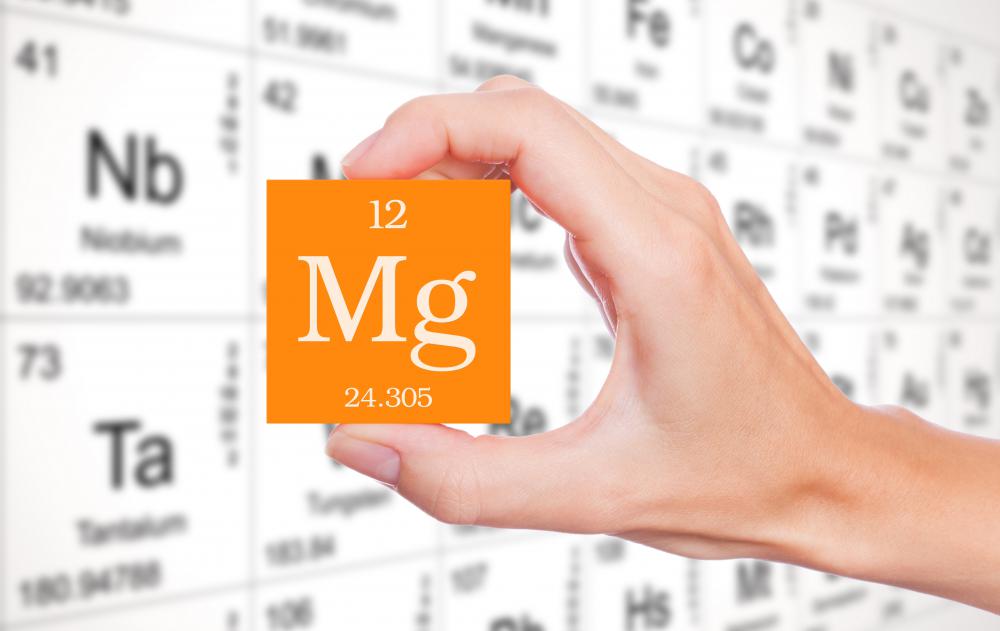At WiseGEEK, we're committed to delivering accurate, trustworthy information. Our expert-authored content is rigorously fact-checked and sourced from credible authorities. Discover how we uphold the highest standards in providing you with reliable knowledge.
What Are the Effects of Too Much Magnesium?
Consuming magnesium is important, consuming too much magnesium can lead to overdose symptoms such as extremely low blood pressure, difficulty breathing, muscle weakness, nausea, diarrhea, appetite loss, and even death. Magnesium is an essential mineral used by the cells of all living organisms to activate enzymes, regulate nutrient levels, and aid energy production. In particular, the human body utilizes magnesium in its tissues, organs, bones, and blood.
It is practically impossible to get magnesium toxicity from eating too much food. Even foods rich in magnesium don’t contain enough of it to pose any health risks. In actuality, the only way to consume too much magnesium is by taking too many magnesium supplements.

Most people obtain the correct amount of magnesium by eating well balanced meals, but some people use magnesium supplements to make up for either a poor diet or a medical condition. Certain diseases, such as diabetes and pancreatitis, can lead to a deficiency in magnesium. Sweating too much, having very heavy menstrual cycles, and consuming too many diuretics, such as coffee, can also cause magnesium deficiency.

Overdosing from too much magnesium via supplements is also difficult because the kidneys are very effective at excreting abundant levels of magnesium. This, however, isn’t the case for individuals suffering from impaired kidney function. Those with this condition are at a much higher risk of suffering magnesium toxicity due to their bodies' inability to effectively excrete excess magnesium.

The most common symptoms of consuming too much magnesium are low blood pressure, muscle weakness, and trouble breathing. If these conditions worsen or new conditions, such as confusion, slurred speech, or a low body temperature, develop, then it is imperative that the individual seek immediate medical attention. Lack of treatment for too much magnesium can eventually lead to cardiopulmonary arrest and even death.

Individuals who are at higher risk of suffering magnesium toxicity include the elderly, those with gastrointestinal conditions, those who are extremely dehydrated, and those on other medications. Those who are already taking medications should seek the counsel of a doctor before consuming magnesium supplements. The risk of a conflict with antacids, laxatives, and narcotics is especially high.

The best way to prevent an overdose from consuming too much magnesium is to not rely on magnesium supplements. People should instead try to eat well balanced and healthy meals full of grains, green vegetables, and nuts. Even tap water has magnesium in it, though only a very minute amount.
AS FEATURED ON:
AS FEATURED ON:















Discussion Comments
Not to mention that the average person doesn't have a good grasp on what constitutes a real balanced diet. I know I don't.
I just try to get a variety of foods. But I do know that just because of the region I live in there might be deficiencies no matter how well I eat. So I don't think it's a bad thing to try and supplement with a vitamin. As long as you don't go nuts with the supplements you should be fine.
@KoiwiGal - Well, I'll go right ahead and say that I don't think the average child needs supplements at all. Everyone is different and kids are particularly sensitive. They could end up with too much potassium or too much calcium or whatever, when you combine their eating habits with a multivitamin.
Unless a child has some kind of known deficiency you should try to feed them a balanced diet, not give them supplements.
This is one of the reasons you have to be extra careful if you decide to give your children vitamins.
You end up with only two choices usually, which is to give them half an adult tablet (which can be difficult to calculate) or give them candy-style tablets specially formulated for children.
The problem is that if they managed to get too much magnesium, the side effects are pretty dreadful and that goes for other vitamins as well.
And the candy style tablets are very tempting. They might try to get one than one per day (even by accident) and accidentally overdose.
It's not that I don't think parents should give their kids these supplements, just be very careful about it.
Post your comments